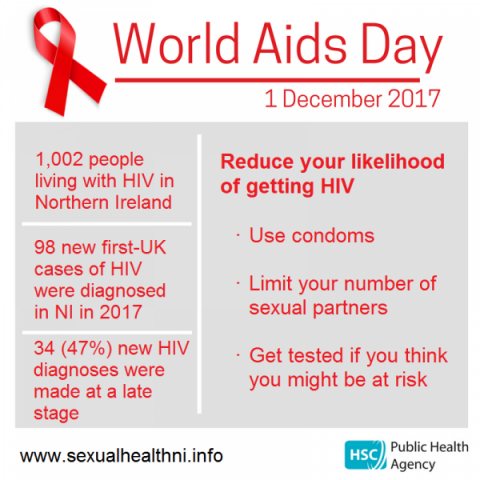HIV surveillance report published – PHA raises awareness of safer sex on World AIDS Day 2017

The Public Health Agency (PHA) is using World AIDS Day today as an opportunity to raise awareness about HIV and encourage people to practise safer sex and get tested if they think they might be at risk. This comes as the PHA publishes its ‘HIV surveillance in Northern Ireland 2017’ report, which provides analysis of the latest HIV data for Northern Ireland.
HIV/AIDS is a viral infection caused by type 1 and type 2 HIV retroviruses. It can be transmitted through sexual contact, sharing of HIV-contaminated needles and syringes, and transmission from mother to child before, during, or shortly after birth.
The report shows that the number of people living with HIV in Northern Ireland is 1,002 – this represents a 9% increase on 2015 (923). These figures reflect both ongoing new diagnoses and the now much-improved survival rates for HIV.
The key routes of transmission remain sexual contact involving men who have sex with men (MSM) and sexual contact between men and women.
During 2016, 98 new first-UK cases of HIV were diagnosed in Northern Ireland. 54 (55%) new HIV diagnoses occurred after MSM transmission, while 36 (37%) occurred after heterosexual transmission. Thirty four (47%) new HIV diagnoses were made at a late stage.
Dr Neil Irvine, Consultant in Health Protection at the PHA, said: “Many people who are living with HIV have no obvious signs or symptoms. The only way of knowing if you have the virus is by taking a HIV test. It is important not to delay seeking advice and taking this test if you feel you have been at risk.
“We know that a significant number of people are being diagnosed at a late stage, which means that the virus may have already had a significant impact on their health. The earlier the condition is diagnosed the more successful treatment is likely to be, so it is very important to get tested if you think there’s a chance that you might have contracted HIV.
“People with HIV have a near-normal life expectancy if diagnosed early and treated promptly. It is estimated that the majority of onward transmission is from those with undiagnosed HIV. Once diagnosed, individuals are less likely to pass on their infection due to treatment and changing their behaviour, so it is essential for both the person with HIV and those with whom they may have sex, that the condition is diagnosed early.”
Between 2007 and 2016 females accounted for 21% of the total new cases diagnosed. Males accounted for 79%, of which 70% were MSM. Diagnostic rates are generally higher in males across all age groups.
Dr Irvine continued: “People are still contracting HIV here, so I want to stress the importance of taking steps to reduce your likelihood of contracting the virus. If you have unprotected sex, you could effectively be sleeping with everyone your partner’s ever slept with, putting yourself at risk of getting HIV or another STI. If you are sexually active, use condoms, limit your number of sexual partners and get tested if you think you might be at risk.”
The report is available at www.pha.site/hiv17
For information, the symptoms of HIV and STIs (as well as information on conditions which may have no symptoms), and for details of Northern Ireland GUM clinics, visit www.sexualhealthni.info
